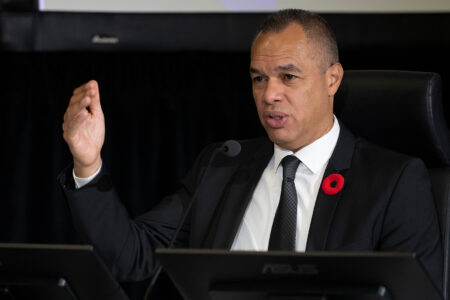
We appear to have a speech problem in this country. And it’s eating away at our democracy like a toddler set loose on a delicious, flaky scone.
Allow me to clarify. By ”œspeech problem” I do not mean we are having trouble speaking. We are certainly doing lots of that. Every day, speech fills our airwaves, our broadband feeds and our public spaces. It’s the quality of the speech that is at issue. And I don’t mean we are lacking in Shakespearean erudition. What I really mean is that we seem to be having trouble with the other key piece of the speech puzzle: listening. Yes, that’s right. Every now and again, we need to take a pause, clean out the earwax and take turns zipping up our word holes while we listen to what someone else has to say.
Thursday night in Scarborough, attendees at an alleged information session about Ontario’s new sex education curriculum were treated to a masterful demonstration of the art of talking-without-listening. Raucous public meetings are nothing new. But what was particularly alarming about Thursday’s meeting was that it was about education. This was a group of politicians and parents and ”œconcerned” citizens gathering to discuss what information about the secret wonderland of human sexuality they will and will not share with their children. What ensued was a travesty of speech.
There were lots of questions asked at the meeting, which is a good start. But what was lacking was any listening to the answers. Concerned parents behaved as though possessed with the rogue spirits of Salem witch burners. They shouted down officials and otherwise trampled all over any possibility of dialogue. Everyone left in precisely the same intellectual shape they arrived in – that is to say, derelict – and a whole lot more upset.
In our saner moments, we all know that learning requires asking questions, listening to answers, asking more questions and then taking what we’ve learned and arriving (or returning to) our own understanding. Sometimes we do better at it – usually when discussing something we find interesting but aren’t particularly passionate about – but often we fall down on the job. Have you ever felt yourself waiting for another person to stop talking just so you can make your point? Of course you have. Welcome to the human condition. It can be hard to listen sometimes, even for our elected officials.
Just look at what’s happening in the parliamentary committee hearings on Bill C-51 this week. This highly formalized ritual of listening (that is, after all, what committee hearings are meant to be) is anything but. Government members appear to be listening to witnesses but, when the words stop falling from those witnesses’ mouths, the government representatives appear content with lecturing those witnesses. No questions. No probing. Just one-way word-barraging. That’s a problem. So is ignoring expert opinion. We cannot all know everything, as much as we may want to. From time to time, we need to listen to someone who has spent time with a subject and listen to what they have to say. The great part is that you still get to make up your own mind. But you’ll be doing it with a richer roster of facts.
You see, democracy requires speech in order to function properly. The whole of speech, not just the talking part. Democracy is, fundamentally, a process of contesting ideas. People share their ideas, we ask questions to be certain we understand the various positions and then we decide. Without the sharing and questioning and listening, there is no democracy. There is only the institutional equivalent of sticking your fingers in your ears and making ”œblah-blah-blah” sounds. I’m going to go out on a limb and suggest that most parents would not want to see that kind of behaviour from their own kids. So let’s stop modeling it for them at public meetings. It’s not just rude it’s dangerous.
Every time we act out and gratuitously trample on the exercise of another person’s speech, we take another reckless bite out of democracy. The Charter of Rights and Freedoms may protect our freedom of ”œopinion and expression,” but only the exercise of good manners and a conscious effort at listening will truly keep us free.






